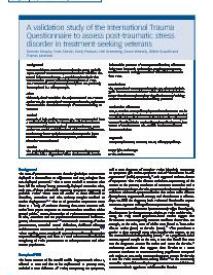A validation study of the International Trauma Questionnaire to assess post-traumatic stress disorder in treatment-seeking veterans
Background
Veterans with post-traumatic stress disorder (PTSD) typically report a poorer treatment response than those who have not served in the Armed Forces. A possible explanation is that veterans often present with complex symptoms of PTSD. ICD-11 PTSD and complex PTSD (CPTSD) have not previously been explored in a military sample.
Aims
This study aimed to validate the only measure of ICD-11 PTSD and CPTSD, the International Trauma Questionnaire, and assess the rates of the disorder in a sample of treatment-seeking UK
veterans.
Method
A sample of help-seeking veterans (N = 177) was recruited from a national charity in the UK that provides clinical services to veterans. Participants completed measures of ICD-11 PTSD and CPTSD as well as childhood and adult traumatic life events. Confirmatory factor analysis was used to assess the latent structure of PTSD and CPTSD symptoms, and rates of the disorders were estimated.
Results
The majority of the participants (70.7%) reported symptoms consistent with a diagnosis of either PTSD or CPTSD. Results indicated the presence of two separate disorders, with CPTSD being more frequently endorsed (56.7%) than PTSD (14.0%). CPTSD was more strongly associated with childhood trauma than PTSD.
Conclusions
The International Trauma Questionnaire can adequately distinguish between PTSD and CPTSD within clinical samples of veterans. There is a need to explore the effectiveness of existing
and new treatments for CPTSD in military personnel.
Declaration of interest
D.M., E.P. and W.B. are paid employees of Combat Stress. N.G. is managing director of March on Stress, a trustee of Forces in Mind Trust and Walking with the Wounded and the lead for military and veterans’ health with the Royal College of Psychiatrists. S.W. is a trustee of Combat Stress. M.S. and T.K. have no conflicts of interest to declare.
Geachte bezoeker,
De informatie die u nu opvraagt, kan door psychotraumanet niet aan u worden getoond. Dit kan verschillende redenen hebben,
waarvan (bescherming van het) auteursrecht de meeste voorkomende is. Wanneer het mogelijk is om u door te verwijzen naar de bron
van deze informatie, dan ziet u hier onder een link naar die plek.
Als er geen link staat, kunt u contact opnemen met de bibliotheek,
die u verder op weg kan helpen.
Met vriendelijke groet,
Het psychotraumanet-team.
In: The British Journal of Psychiatry ; ISSN: 0007-1250 | 216 | 3 (themed issue: disasters and trauma) | 132-137
https://doi.org/10.1192/bjp.2020.9


